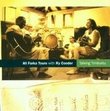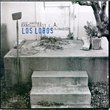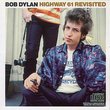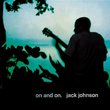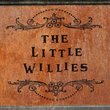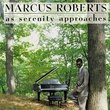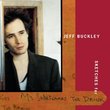| All Artists: Ali Farka Toure Title: Radio Mali Members Wishing: 4 Total Copies: 0 Label: Nonesuch Original Release Date: 9/28/1999 Release Date: 9/28/1999 Genres: International Music, Jazz, Pop Style: Africa Number of Discs: 1 SwapaCD Credits: 1 UPC: 075597956924 |
Search - Ali Farka Toure :: Radio Mali
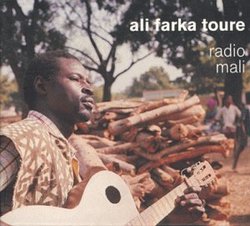 | Ali Farka Toure Radio Mali Genres: International Music, Jazz, Pop
One of the most internationally successful West African musicians of the last decade, guitarist and singer Ali Farka Toure was approaching the age of 50 when his self-titled album came to the attention of the world music a... more » |
Larger Image |
CD DetailsSynopsis
Album Description One of the most internationally successful West African musicians of the last decade, guitarist and singer Ali Farka Toure was approaching the age of 50 when his self-titled album came to the attention of the world music audience in the late '80s. Since then, he's toured in North America and Europe and recorded with artists such as Taj Mahal and members of the Chieftains. But it was his Grammy-winning 1994 collaboration with Ry Cooder, "Talking Timbuktu," that won him on a larger scale. Inspired by African rhythmic and musical traditions extending back for generations, this album features materials originally recorded for broadcast on Radio Mali from 1970-78, and loaned by the station's archive. It was these tapes that introduced Toure's unique guitar style to the attention of his countrymen. Once available in France on vinyl, these were among the very first commercial records of Malian music. Available briefly as an import CD, this treasurable collection comes to the U.S. at last with major distribution, and arrives as his latest release on Ryko hits the #1 spot on the CMJ world chart. Similarly Requested CDs
|
CD Reviews"I work with the spirits" Pharoah S. Wail | Inner Space | 12/17/2000 (5 out of 5 stars) "The magic of this cd is that it contains Ali's most "traditional African" music. As he says in the liner notes to his cd, NIAFUNKE, for a while his music became Westernized, basically Afro-Pop. Luckily for us, NIAFUNKE and RADIO MALI do not suffer from the Afro-Pop affliction. This cd is entirely acoustic, as opposed to NIAFUNKE which has him on both acoustic and electric guitars. I want to clear one thing up from the Amazon.com review. The "violin" that is mentioned is the African njarka violin. The njarka is a one-string instrument that is about 9 or 10 inches long. I just don't want anyone thinking of the Western violin. Technically, the njarka is a rather crude instrument but it releases a glorious sound, as if the earth herself is singing. If you ever see Ali in concert (and you really should see him in concert!) you will hear the full emotional power of the njarka in the hands of a master.Ali is the original musician who translated traditional Malian music to the guitar and then later melded this together with a touch of the blues. He is in great form on this cd. Just by listening you won't know what he is singing about (since he sings in his traditional languages) but this may actually be an advantage. You won't get caught up in analyzing lyrics or stories, you will simply feel him translating his emotions into music. If you are completely unfamiliar with Ali's music (or any African music at all) then I suggest that NIAFUNKE may be a better choice. It has a bit more of the blues influence than this cd does, and for that reason alone I think it may possibly be a smoother transition into his music for people who are unfamiliar with him. In all honesty though, I'd recommend purchasing both cd's. They show different sides of the same man, are seperated by 2 decades, and both display the full passion and depth of the Malian musical tradition. Ali is an incredible songwriter on both cd's, you don't even need to know specifically what he is singing about to be completely moved by the manner in which he performs his songs." The original Ali Farka Toure nadav haber | jerusalem Israel | 11/19/2002 (5 out of 5 stars) "This is row music, the most traditional of Farka Toure's recordings. when I first heard him, on "The Source", I too thought of John Lee Hooker. This impression gradually faded on "The River" and completely disappeard when I heard this cd. Farka Toure is an original, and in this cd there is only one track that may be influenced by the blues, which is Hani (track 7). The rest of the cd is hauntingly beautiful, and rewards each listening with fresh discoveries. In AFT I found a rare instance where a musician's voice and guitar playing rival each other for beauty and skill, with both coming up as winners. I agree with those who say this cd is better appreciated after hearing other AFT cd's, or for people who have listened to other Malian musicians. I would also like to draw attention to the beautiful liner notes and to AFT's remarkable story of how he became a musician." Great Ali Farka Touré CD...but have your hand on the volume! Jesse Calcat | Rochester, MI USA | 12/22/2004 (4 out of 5 stars) "I have listened to a lot of Ali Farka Touré, primarily his later works, and especially Niafunké. I must say that this CD was both refreshing and a tiny bit dry. The first track is like a cup of strong coffee first thing in the morning, with Ali and another musician playing a little duet on njarka violins, with Ali suddenly speaking very rapidly and loudly. It sounds like he's introducing himself, as one hears 'Mali' followed by 'Bamako.' There are some REALLY good tracks on this CD, especially Machengoidi, Samariya, and my favorite, Hani. All of the tracks are good, but Niafunké is still my favorite AFT CD. I understand that these are old recordings, and perhaps the mixing isn't the best, but I would really recommend that you have your hand on the volume control while listening to this CD. Ali's voice seems to have gotten better with time. On Niafunké, his voice is a smooth, velvety, deep baritone. On Radio Mali, however, it is significantly more nasal, is somewhat grating, and lacks the beefiness that you hear in Niafunké. The vocals seem to be far too loud in comparison to the instruments, and anyone who is familiar with AFT's music knows that he's not shy about using his voice. On many tracks, the guitars' introduction lull the listener into a trance, only to be violently shaken out of it by Ali's younger, much more nasal voice attacking a high note. This happens several times throughout the disc, and I've often found myself reaching for the volume knob. The music tends to get somewhat redundant. With a whopping 16 tracks, the same instrumentation (usually two acoustic guitars, with an occasional ngoni [not the kamalengoni of the Bambara, but an instrument more similar to the Tuareg tahardent lute]), and Ali's habit of not utilizing more than a few keys, the songs begin to sound very similar. Perhaps the CD just hasn't grown enough on me....but I agree with one of the other reviewers of this CD that this is best appreciated by one who has heard other Ali CDs. I am well accustomed to VERY diverse and unique music, and this CD actually began to bore me a little bit near the end. I think this CD is great for die hard Ali fans. And for those of us less dedicated Ali fans, it's a very interesting compilation of his earliest recordings. Great music to relax to."
|

 Track Listings (16) - Disc #1
Track Listings (16) - Disc #1